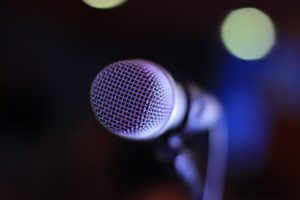 Picking the best podcast microphone is something every podcaster will face. Sure, you can podcast with your phone recorder, but if you’re ready to get super serious about the artistic elements of content creation, you’ll want a top-tier microphone.
Picking the best podcast microphone is something every podcaster will face. Sure, you can podcast with your phone recorder, but if you’re ready to get super serious about the artistic elements of content creation, you’ll want a top-tier microphone.
(For a quality podcast, it’s more than the microphone choice you will have to make. Podcasters will also be faced with picking a podcast host, and Blubrry is here to get you started in that department.)
The primary objective of a podcast is to communicate information, ideas, or stories through audio. A good microphone ensures that your voice is captured clearly, crisply, and without distortion; we have always said you can forgive lousy video, but if the audio sucks, game over.
High-quality audio signals professionalism to your audience. If your podcast sounds clear and well-produced, listeners are more likely to trust you as a credible source of information and entertainment, which can lead to increased engagement and a growing listener base.
A good microphone helps minimize background noise, echo, and other audio distractions that irritate listeners. A good microphone captures audio that requires less editing and processing in post-production. This saves time and effort, allowing you to focus more on content creation and promotion.
With the ever-growing number of podcasts, standing out from the crowd is essential.
So what podcast microphone should I choose?
We say always save your receipts because one mic may sound good for a co-host but not sound good for you. Always have the option to return it. The following are great microphones at various price points. If you are new to podcasting, we suggest not overspending.
Here are a few suggestions
| Budget Mics | Premium Mics |
|---|---|
Dynamic Versus Condenser
There is a difference in microphone types. Most podcasters that do not have a full-blown studio will want to stick to Dynamic microphones versus Condenser microphones.
Dynamic microphones are known for their durability and ability to handle high sound pressure levels. They are often used for live performances and recording in loud environments. They have a simple design, require no external power source, and tend to be less expensive than condenser microphones.
Condenser microphones are more sensitive and responsive to subtle sound variations, making them popular for recording vocals and acoustic instruments. They require external power, often as phantom power from a mixing board or audio interface, and can be more expensive than dynamic microphones. They also tend to be more fragile and sensitive to extreme temperatures and humidity.
Do I Need a Podcast Mixer?
In the podcasting environment, a microphone plugged into your USB port is often sufficient if you use external recording platforms. Below is a list of platforms that many podcasters use. Quality of recording, in our opinion, is ranked top to bottom.
- SquadCast (www.squadcast.fm) – Another platform catering to podcasters, providing high-quality remote recording capabilities.
- Cleanfeed (www.cleanfeed.net) – A web-based platform for live, high-quality audio recording and broadcasting.
- Zoom (www.zoom.us) – A well-known video conferencing platform that allows recording meetings and webinars.
- Microsoft Teams (www.microsoft.com/en-us/microsoft-teams) – A collaborative platform with video conferencing and recording capabilities.
- Google Meet (meet.google.com) – A video conferencing service from Google that allows users to record meetings.
What if I am recording in my home studio with all the participants?
Several years ago, Rode introduced the Rodecaster, and in our opinion, this is the way to go for podcasters with no more than four people in person. Some podcasters have a Rodecaster for playing sound effects and more mic control, even when using one of the resources above.
If you plan on having more than four people in the studio, things can get complex, and we recommend that you contact our support team to help you determine the best podcast package. We have over 80 years of podcasting experience across the team and can help you.




